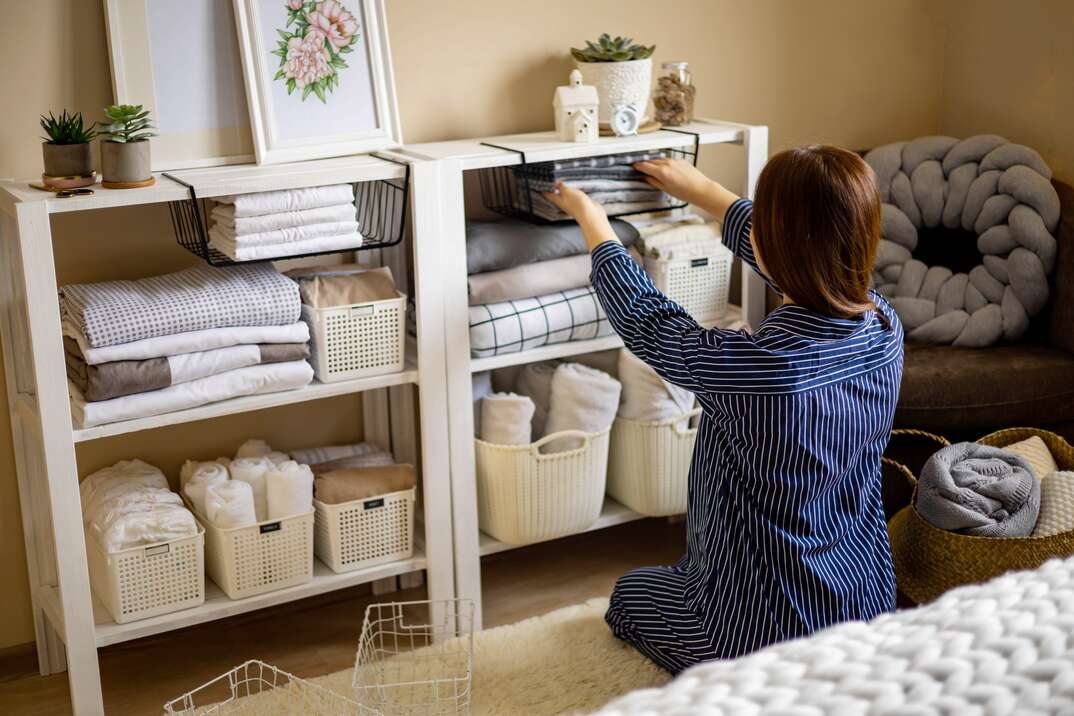- AppliancesElectriciansHVACLandscapingLocksmithPest ControlPlumbingRenovationRoofingT V RepairAll Home Improvement
- Car AccidentClass ActionCorporate LawCriminal DefenseDivorce LawEmployment LawFamily LawFinancial LawLegal AidMedical Injury LawyersMedical MalpracticeReal Estate LawWater Fire RestorationAll Legal
- InvestmentRetirementAll Finance
- Animal InsuranceAutoGeneral InsuranceHealth PolicyHome RentersAll Insurance
- DentalHealth SpecialistsAll Medical
- Animal CareVeterinaryAll Pets
- Auto GlassTowingAll Automotive
So You've Organized Your Home. Here's How to Keep It Organized

Whew! You survived organizing your home. But what comes next? How do you stay organized once you find a place to put everything?
Read More Home Improvement Articles
Check out these tips on how to stay organized so you can enjoy a tidy home where it's easy to find the items you need.
Organizing your home isn't a one-time event. Sure, a major decluttering and organization session leaves your home looking great, but it's easy to fall back into old habits when you're busy and doing your day-to-day activities. You may let the mail pile up on the counter again, or the kids might toss their backpacks by the door. Try these strategies to learn how to stay organized long-term.
1. Have Assigned Spots for Everything
As part of your initial organization, make sure everything has a dedicated spot. That could be hooks in the mudroom for backpacks or a bin to hold hats. Arrange items in your cabinets, closets and pantry in a logical way, such as by item type or how often you use the items. You might find that organizational tools make this easier. Examples include drawer dividers, storage bins, baskets and over-the-door organizers. You might also choose item-specific organization solutions, such as shoe racks, spice racks, water bottle holders and makeup storage containers. Adding labels to shelves or storage containers can help everyone know where items belong.
2. Train Your Family
How do you stay organized when you have kids and other family members tossing things everywhere? Try giving them a crash course on how to stay organized. Getting everyone on board with your strategies to stay organized can save you time and reduce stress.
Talk to your family about why you added new storage methods and other strategies, and show them how to use the tools you have. They might need some reminders when it comes to putting things where they belong. Asking your family for feedback on the new organizational tools could also help. They might suggest better ways to keep the home organized, especially for their own belongings.
3. Don't Delay Tasks
Putting things away as soon as you're done with them is ideal. For example, if you're cooking breakfast, putting all the ingredients away and washing the dishes when you're done keeps your kitchen tidy. That way, it's clean when you go to cook meals later. When possible, tackle cleaning and organizational tasks right away, especially if they only take a minute or two to complete.
More Related Articles:
- How Much Does a Home Inspection Cost?
- 4 Tips for Hiring a General Contractor for Your Next Remodeling Project
- Should You Hire a Contractor or a Handyman?
- 5 Things to Look For When You're Hiring an Electrician
- What to Look for When Hiring an Exterminator
4. Set Aside Time Daily and Weekly
Some tasks, such as putting away laundry or washing dishes by hand, might take more time than you have available. Dedicating time daily or weekly to those tasks gives you more time while ensuring you complete them. It's also helpful to set aside 15 to 20 minutes each day for general cleaning and organizing. You might make a quick pass through the house and look for things that are out of place, for example.
5. Get Into a Routine
You don't have to be super-structured and rigid, but having regular routines helps you cover all the cleaning and organizing tasks you need to complete. Do your chores in the same order each day so you don't forget them. Simplify your routines for cleaning and organizing to make them as efficient as possible.
6. Use Lists
Lists help you keep track of organizing tasks to keep your home tidy. You might create a checklist with specific cleaning and organizing tasks that you do regularly. It can also be helpful to have a to-do list for each day. If an organizational or cleaning task comes up that you don't have time to do immediately, add it to the list so you don't forget to do it later.
How Often Do You Need to Reorganize Your Home?
Every home is different, so how often you declutter depends on your family's habits and environment. If you're a minimalist and naturally keep things organized, you might not need to reorganize very often. However, if you have more belongings or your family members aren't as naturally organized, you might need to declutter and reorganize every month or two.
Check in with yourself every few months or at least a couple of times each year. Does your home still seem organized, or is it becoming difficult to find things again? Does your organizational system work well for your lifestyle? Have you had any major life changes that might require different organizational strategies? Any of these situations might mean it's time to reorganize your home so it's easier to stay organized.
Elocal Editorial Content is for educational and entertainment purposes only. Editorial Content should not be used as a substitute for advice from a licensed professional in your state reviewing your issue. Systems, equipment, issues and circumstances vary. Follow the manufacturer's safety precautions. The opinions, beliefs and viewpoints expressed by the eLocal Editorial Team and other third-party content providers do not necessarily reflect the opinions, beliefs and viewpoints of eLocal or its affiliate companies. Use of the Blog is subject to the
Website Terms and Conditions.The eLocal Editorial Team operates independently of eLocal USA's marketing and sales decisions.

